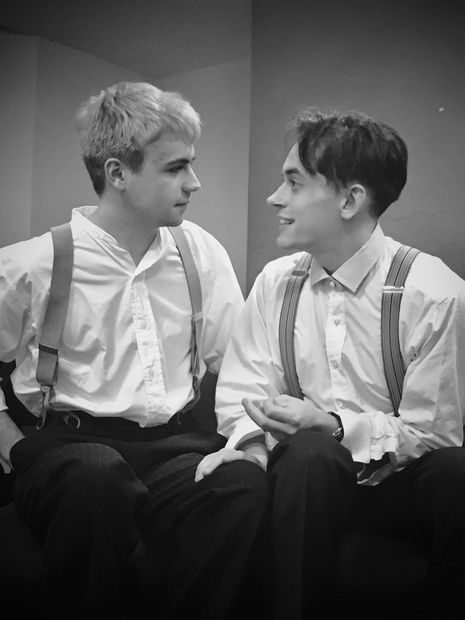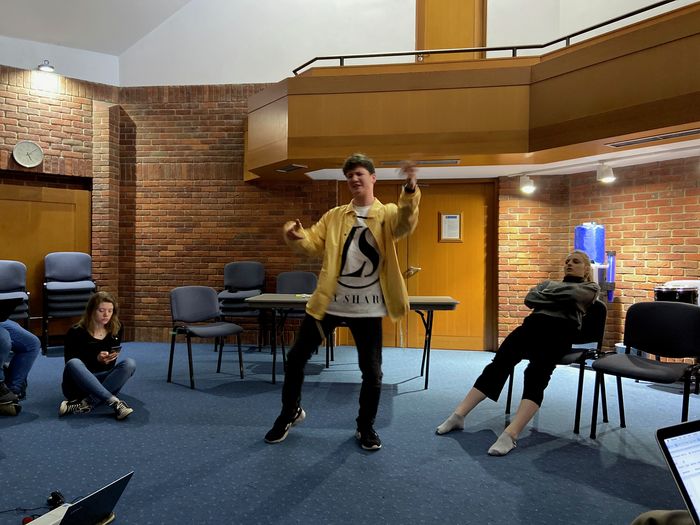Let yourself be charmed by this irresistibly self-indulgent production of Maurice
Estella Nouri finds much to delight in with this funny, camp, yet serious play

Oh Maurice! It’s hard not to be enamoured by this bittersweet tale of love and confusion, with dashing young men raving about the Symposium and fawning over Tchaikovsky on the lawns of Cambridge. Maurice makes a timely appearance for LGBT History month and remains a powerful exploration of sexuality in Edwardian England, masterfully showcasing Maurice’s struggle to come to terms with who he is in a world that does not wish to accept him. Maurice feels fresh, raw, and succeeds in breathing life and youth into the past.
The struggle with a show such as Maurice lies in adapting a book to the stage without losing the essence of the story. In a series of vignettes, Maurice’s time at Cambridge and beyond is brought to life, detailing his relationships with Clive Durham and Alec Scudder, his increasingly turbulent relationship with his family, and his attempts to ‘cure’ himself of his homosexual attractions. The whole affair is watched impassively by William Batty as hypnotist Mr. Lasker Jones, an imposing, grave, and solemn presence on stage, enigmatically scribbling into his notebook as the scenes unfold. Although it was sometimes difficult to follow the plot – transitions were abrupt, and there was rarely any indication of how much time had elapsed from one scene to the next – overall, the adaptation worked well, alternating between longer, intense moments and quicker, lighter ones.
'Matthew Paul’s performance as Maurice was nothing short of breath-taking'
Matthew Paul’s performance as Maurice was nothing short of breath-taking and by far the most memorable part of Maurice. Throughout the play, he succeeded in infusing something child-like into his character, wringing his hands and clasping his feet, relaxing only briefly and tentatively. The confusion, frustration, and shame he felt appeared in explosive bursts alongside tender, naïve, and genuinely funny moments. Under Ell Aitken’s direction, his body language was the perfect balance of awkward and earnest, making his struggle heartbreakingly tangible. Maurice felt young, sincere, and strangely hopeful. This added to the final scene’s sense of triumph and optimism – an ending important to Forster.

Jesper Eriksson as Clive Durham, however, was more uneven. He certainly looked the part – floppy hair, chiselled face – but sometimes lacked the flair and buoyancy needed to clinch the chemistry with Maurice. He redeemed himself in a few intense scenes, but I couldn’t shake the feeling that there was a missing playfulness and cheek that would have electrified the rest of the performance. In the final scene however, he succeeded in being crestfallen and bewildered, leaving the audience on a powerful note. The chemistry between Alec Scudder (Sam Drysdale) and Maurice also felt a little off, but Drysdale was a fun and energising presence on stage, playing into the role of Durham’s groundskeeper with great comedic value.
'Em Jones’ set design was wonderful – oh, that chaise longue!'
I was delightfully surprised by Stanley Lawson’s brief but memorable appearance as Risley, delivered with flair and a campiness that had the audience in a state. Helena Fox also deserves a mention for her hilarious execution of Mr. Ducie, Maurice’s schoolteacher – drawing a phallus in the sand with her cane was humorous touch. Ella Muir also did a fabulous job on costumes, and Em Jones’ set design was wonderful – oh, that chaise longue!
Ell Aitken has succeeded in delivering a lively adaptation of Maurice. It was sweet and heart-breaking to watch, masterfully navigating the themes of sexuality and growth while remaining witty and sincere. Maurice is timeless in its message, and this adaptation conveyed this with humour and gravity.
 News / Cambridge welcomes UK rejoining the Erasmus scheme20 December 2025
News / Cambridge welcomes UK rejoining the Erasmus scheme20 December 2025 News / CUP announces funding scheme for under-represented academics19 December 2025
News / CUP announces funding scheme for under-represented academics19 December 2025 News / News in Brief: humanoid chatbots, holiday specials, and harmonious scholarships21 December 2025
News / News in Brief: humanoid chatbots, holiday specials, and harmonious scholarships21 December 2025 News / SU reluctantly registers controversial women’s soc18 December 2025
News / SU reluctantly registers controversial women’s soc18 December 2025 News / King appoints Peterhouse chaplain to Westminster Abbey22 December 2025
News / King appoints Peterhouse chaplain to Westminster Abbey22 December 2025









